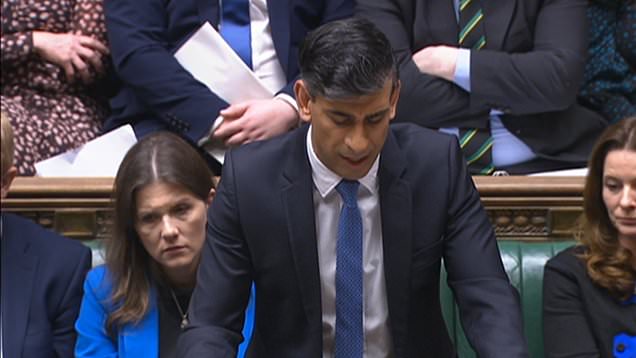UK
The Gaza vote danger for Keir Starmer, explained
Story by Chloe Chaplain • TODAY
MPs will today debate and vote on whether to call for an immediate ceasefire between Israel and Hamas amid mounting concern at the humanitarian crisis in Gaza.
Global leaders have ramped up demands for action in the region, with Prince William and Foreign Secretary David Cameron the latest to warn too many lives have been lost in the region.
But today’s vote is as much about domestic politics as it is about the international situation.
The Commons has been pushed into the vote by the Scottish National Party (SNP), which has used a rare opposition day to table a motion demanding an immediate ceasefire.
It represents a political challenge for Labour leader Sir Keir Starmer, who until now has resisted calls for an immediate ceasefire and suffered a Commons rebellion for doing so.
Now, Labour has shifted its stance and backed a ceasefire but with significant conditions that outline the need for fighting to stop on both sides.
It is an attempt from the party leadership to avoid another Commons rebellion and push for a ceasefire that, they argue, the whole House could unite behind.
The ceasefire amendments
The SNP motion states the House “calls for an immediate ceasefire in Gaza and Israel”. It goes on to set out concerns about the death toll in the region and “condemns any military assault on what is now the largest refugee camp in the world”.
Whilst the motion does demand “the immediate release of all hostages taken by Hamas and an end to the collective punishment of the Palestinian people” it does not set out detailed conditions for the ceasefire.
Related video: Labour eventually calls for immediate humanitarian ceasefire in Gaza (Daily Mail) Duration 1:23 View on Watch

Daily Mail PM supports fighting 'pause' as Tories plan to vote no on ceasefire
2600:00

Daily Mail Keir Starmer calls for an immediate ceasefire in Gaza
1:51

The Independent Keir Starmer calls for ‘permanent’ Gaza ceasefire in speech at Scottish Labour conference
1:15
Labour’s amendment does, however, add more detailed specifications.
It calls for “an immediate humanitarian ceasefire, which means an immediate stop to the fighting and a ceasefire that lasts and is observed by all sides”. This is the first time the party has used such strong language.
The amendment also specifies that “Israel cannot be expected to cease fighting if Hamas continues with violence and that Israelis have the right to the assurance that the horror of 7 October 2023 cannot happen again” and sets out support for efforts to achieve a lasting ceasefire.
Another Government-led amendment to the motion does not call for a ceasefire right away but “an immediate humanitarian pause” with the aim of leading to a ceasefire at a later point.
It sets out support for “Israel’s right to self-defence, in compliance with international humanitarian law, against the terror attacks perpetrated by Hamas”.
And it “urges negotiations to agree an immediate humanitarian pause as the best way to stop the fighting and to get aid in and hostages out” as well as “moves towards a permanent sustainable ceasefire”.
What is the significance?
The distinction here is that the SNP are demanding an immediate ceasefire and the Conservative Government are arguing for a “pause” which could lead to a ceasefire later down the line.
Labour are taking a compromise position, which marks the first the party has significantly diverged from the Government stance.
The party has made the point that its position is in line with allies Australia, Canada and New Zealand’s – indicating it is reflective of a wider international position and not the Labour party going out on a limb.
But Sir Keir is also hoping that his amendment will avoid another rebellion which would see Labour MPs going against the party stance to vote for the SNP motion.
Differences over whether to call for an immediate ceasefire in Gaza have previously caused problems for the Labour Party, and Wednesday’s vote could reopen those divisions once again.
A similar motion tabled by the SNP in November saw 10 shadow ministers and parliamentary aides rebel to back an immediate ceasefire, with 56 Labour members defying a three-line whip and backing an amendment to the King’s Speech.
Which amendment was selected?
It was not guaranteed that Speaker, Sir Lindsay Hoyle, would select Labour’s amendment which would have left Sir Keir facing a difficult challenge of deciding whether to order MPs not to vote for the SNP motion. This would have left him facing a significant rebellion.
To the relief of the Labour leadership, Sir Lindsay announced he was calling both the Labour and Government amendments – with the Labour amendment to be voted on first.
Sir Lindsay Hoyle explained that he wanted MPs to have the “widest possible range” of options in the Gaza ceasefire debate because of its importance.
The Commons Speaker said: “This is a highly sensitive subject on which feelings are running high, in the House, in the nation, and throughout the world. I think it is important on this occasion that the House is able to consider the widest possible range of options.”
A Liberal Democrat amendment calls for an “immediate bilateral ceasefire”, the release of hostages and a two-state solution with Hamas not in power, was not selected by the Speaker.
The SNP and Government are angry about the decision of the Speaker to allow a vote on the Labour amendment first. This is because, if it is passed, the motion in its original form will not be put to a vote.
Why Starmer could still face revolt
Labour MPs have privately said many want to vote for a ceasefire regardless of the specifics of the amendments. While they support Sir Keir’s alternative amendment, they would vote for the SNP motion with or without it, some said.
It is not yet clear whether the Government will whip MPs to vote against the Labour amendment or allow them to abstain.
If Tory MPs are asked to vote against the Labour amendment, it could fail. This would then mean Labour are forced to vote on the SNP amendment in its current form – without the conditions applying to a ceasefire.
This would leave Labour MPs with the choice between voting for or against a ceasefire, or abstaining. Given the strength of feeling in the party it is expected that a large number of Labour MPs would vote for a ceasefire regardless of what the leadership instructs.
As a result Sir Keir could face a rebellion of the size, or larger, than seen in November.
No comments:
Post a Comment